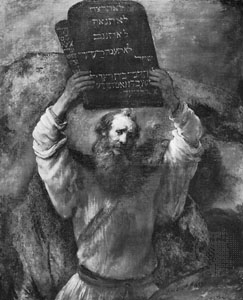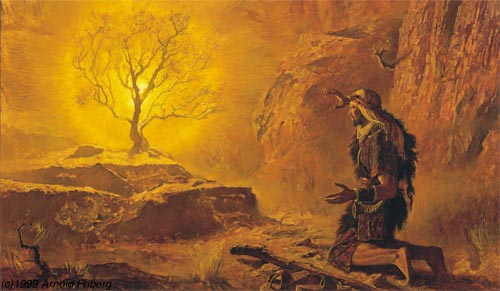(Chapter 1)

We’ve begun studying the book of Exodus in our Sunday school class. While I haven’t been able to devote as much study and research as I would like to this book, I still want to write and point out some observations pertaining to each chapter. Maybe this will help solidify in my mind the story about God, Israel, and Moses that’s found in Exodus.
Intro to Exodus
Exodus falls into the group of books known as the Pentateuch (the first five books of our Bible). The book picks up where Genesis leaves off (though many years later). Towards the end of the book of Genesis the Israelites have moved south to live in Egypt (Genesis 46:1-7). One of Jacob’s own sons, Joseph, had asked them to join him there. Joseph has found favor in the Pharaoh’s eyes and the Pharaoh allowed him to be a ruler over the land (Genesis 41:38-45). After moving to Egypt the Israelites settle in Egypt. Many years later we pick up with their story in the book of Exodus.
I’m fascinated with this book of our Bible. There’s so much going on. We see God beginning to work out His plan of redemption for humanity. We also see God beginning to work through a group of people (the Israelites) instead of individuals/families. God also refers to this group as, “My Firstborn” (4:22). But, at the same time God is still working in the lives of individuals. We see that in chapter 1.
Exodus 1
Chapter 1 starts off with the Israelites fulfilling God’s promise to them that He would bless them and make them into a great nation. Exodus 1:7 reads,
The sons of Israel were fruitful and increased greatly, and multiplied, and became exceedingly mighty, so that the land was filled with them.
This promise and blessing were given to Abraham back in Genesis 12:2. We see that God keeps His word. Getting back to Exodus we see that the Israelites’ fruitfulness has caused quite a stir amongst the Egyptians. There’s a new Pharaoh and he’s annoyed and worried about the situation. He foresees the Israelites allying with their enemies to destroy them. So, as a precautionary measure (it’s scary what fear will lead one to do) he does two things:
1. Makes the Israelites work harder (v.11). This harsh treatment actually backfires according to verse 12. It tells us that the Israelites grow more numerous because of their affliction.
2. Asks the Hebrew midwives to kill all Israelite babies who were male (v.15-17). It’s amidst this turn of events that we see God working in the lives of individuals. The Hebrew midwives, Shiphrah and Puah, deny the Pharaoh the privilege of aborting the baby boys. Why did they throw out the Pharaoh’s orders and later lie to him? According to verse 17 it’s because they feared God. We see that God actually rewards their holy fear for Him in that He established households for them (v.21). What an incredible act of faith by these Hebrew women! What were the men doing during this time? Why didn’t they stand up? Did they fear God as much as theses women? Those are just a few questions that pop up in my head while reading through this first chapter.
The Israelites are in some serious trouble in Egypt. Exodus 1 does a good job of setting the stage for a redeemer of the people of God.
Exodus
(Chapter 2, pt.1)
This chapter of Exodus covers a lot of ground. We go from baby Moses to adult Moses in just a few verses. Therefore, I’m going to break it into three sections to help clarify what’s going on.
The first section, verses 2:1-11 gives us another glimpse into the life of an extraordinary person of our faith. Would you be surprised if I told you it was a woman? Moses’ mom takes one good look at her baby boy and decides she’s keeping him. Exodus 2:2-3 reads,
The woman conceived and gave birth to a son; and when she saw that he was beautiful, she hid him for three months. But when she could hide him no longer, she got him a papyrus reeds basket and covered it over with tar and pitch. Then she put the child into it and set it among the reeds by the bank of the Nile.
What happens as a result of her faith? The Pharaoh’s daughter finds baby Moses and has pity on him. She feels for the helpless child. Exodus then tells us that the Pharaoh’s daughter has him nursed (listen to this) by his own mother and (it gets better) she pays her for doing it. Isn’t that every parents dream to figure out how to get paid for raising their kids? This blessing didn’t last forever because later on when Moses was a little older he was brought to the Pharaoh’s daughter and he became her son (v.10).
So we see in Exodus 2:1-11 the birth of Israel’s redeemer, Moses. It was definitely a special birth that no one would forget. Moses’ birth also sets the stage for how Moses will be brought up and raised (Egyptian). This directly plays into parts of his story and some of the things he does.
Exodus
(Chapter 2, pt.2)
In this next chunk of scripture we find Moses and he’s grown up. He’s an adult now and he enters into an adult situation. Verse 11 records it this way,
Now it came about in those days, when Moses had grown up, that he went out to his brothers and looked on their labors; and he saw an Egyptian beating a Hebrew, one of his brothers.
Instead of talking it out, Moses decides it best to kill the Egyptian who was mistreating the Hebrew. He does it and then tries hiding the dead corpse in the sand. It’s not long after this that Moses walks in on another adult situation. Only this time it’s two of his own people arguing (v.13). He tries intervening and they reject it and remind him that they know he killed an Egyptian. One of them comments in verse 14, “Who made you a prince or a judge over us? Are you intending to kill me as you killed the Egyptian?” Afraid of more than just the Israelites finding out about his murder, Moses flees.
Exodus
(Chapter 2, pt.3)
The last section of Exodus tells us about where Moses ends up after his escape. We find Moses settling in the barren country side of Midian. Then something interesting happens. The priest of Midian’s seven daughters show up to draw water from the well; a well that Moses happens to be sitting by (v.15). Apparently some of the other shepherds don’t like their presence and harass and try driving them away. It’s interesting because here Moses gets a small chance to deliver some people (v.17). We see God subtly rebuilding and restoring Moses. Through this bold task, Moses wins the favor of the daughters’ father, a man named Reuel, which leads him to win the favor of his future father-in-law Jethro.
Then Jethro invited Moses to live with him, to live with him and learn how to shepherd. What a change for Moses. From the palaces of Egypt to the grimy sands of Midian. Nevertheless, Moses adapts and even starts a family. Verses 21-22 reads,
Moses was wiling to dwell with the man, and he gave his daughter Zipporah to Moses. Then she gave birth to a son, and he named him Gershom, for he said, “I have been a sojourner in a foreign land.”
It’s after this that we are taken back to Egypt. We’re told three things of significance here:
1. The Pharaoh had died (v.23).
2. The Israelites were still in bondage and were crying out for God to deliver them (v.23).
3. God was listening to His children cry out and He remembered His covenant with Abraham, Isaac, and Jacob (v.24).
Exodus 2 teaches us that God is always listening. We learn that even though he may seem quiet, it doesn’t mean He isn’t moving or working. During Israel’s groaning, God was preparing Moses in the wilderness. He was preparing Moses to lead the Israelites out of Egypt. The last couple verses teach us that God’s ear is always turned to the brokenhearted. Let me let you read His words found in Exodus 2:24-25,
So God heard their groaning; and God remembered His covenant with Abraham, Isaac, and Jacob. God saw the sons of Israel, and God took notice of them.
Exodus

(Chapter 3)
In Exodus 3 God speaks to Moses from a burning bush. It’s an amazing story, but maybe more amazing is what we learn about God and His plan of redemption. Here He is going to reveal that plan (working with an entire nation) to Moses.
We start off with Moses noticing a burning bush. Some Bible dictionaries point out that it wasn’t uncommon to see a bush burning up. The intense heat and dry conditions made it easy for a bush to spark and catch fire. But, the difference here is that this bush was not consumed by the fire (v.2). It didn’t burn up. Moses takes notice of this strange occurrence and investigates it (v.3-4). See, it always pays to investigate things. The discovery here is God Himself.
It’s neat to note that toward the end of verse 4 God calls Moses by his name. There’s no doubting the fact that God is personal and knows us. I wonder what ran through Moses’ mind as he stood before a burning bush calling his name. I’m sure it would capture your attention as it did his.
God calls and asks Moses to take his sandals off because he’s on holy ground now. Wanting Moses to know who He was, He describes Himself to Him,
“I am the God of your father, the God Abraham, the God Isaac,
and the God of Jacob.”
We see Moses’ reaction in verse 6,
Then Moses hid his face, for he was afraid to look at God.
Verses 7-9 show us God plan for Israel. Moses had to be floored because he was part of that redemptive plan. He was the one who would go and deliver the Israelites. We see the humbleness in Moses in that he doubts his abilities to perform such a task (v.11). It seems a little weird that Moses would doubt amidst the presence of God. The ensuing verses show us God fleshing out His plan in more detail to Moses (v.12-22). The chapter ends, but the encounter with God continues into the Exodus 4.
Click --> here to go back to home page.

No comments:
Post a Comment